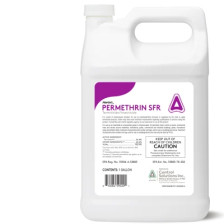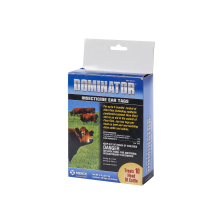How to Manage the 4 Major Fly Types That Impact Cattle Herds
Now that the weather is warming up and fly season is underway, the key to a successful fly control program is understanding the different types of flies that affect your cattle herd.
There are four major types of flies that can wreak havoc on your livestock. Knowing a little bit about each type of fly will help you create an effective plan of action to deal with:
House Flies
Stable Flies
Horn Flies
Face Flies
Download free FBN® Grass Turnout Guide to learn about fly types and recommended fly control products, and continue reading below for further information.
Want to learn more about specific fly types? Search our Pest pages for fruit flies, horse flies, dog flies, and more.
1. House Flies
The most common type of fly in the United States, house flies are a common pest to humans and affect all types of livestock. Often found in warm areas out of the wind, they typically eat garbage, manure, animal carcasses, human food, and livestock feed.
House flies breed on any organic matter with 40-70% moisture, including fresh manure, spilled liquid, feed, bedding, and decaying vegetation. In other words, anywhere that is moist. House fly larvae (aka maggots) look like small grains of rice. The house fly life cycle is typically 15-30 days.
While house flies are known to transmit pathogens to humans, they generally aren’t harmful to livestock. They are more of a nuisance and will aggravate animals more than anything. However, it’s still worth ensuring they are controlled to prevent undue stress on your animals.
When it’s time to eradicate house flies, your key plan of action is to control sanitation around livestock, larva control, baiting, and sprays. Starbar® Fly Terminator® Pro Fly Trap With Attractant is an effective product to help control house flies.
2. Stable Flies
Stable flies have a painful bite and affect all types of livestock by feeding on their blood. They tend to feed on the legs of cattle.
Stable flies have a life cycle of about 21-30 days. They rest in vegetation and breed on wet straw, spilled feed, and decaying vegetation. Surprisingly, stable flies do not breed in manure.
Stable fly bites are stressful to cattle and can cause anemia, decreased weight gain, and decreased milk production. According to the USDA, stable flies cost producers more than $2 billion per year in lost production.
Permethrin SFR, which dilutes with water or oil, is a particularly effective spray to help eliminate stable flies. It is labeled for use on lawns, landscapes, around homes, and barns for a very broad spectrum of insects beyond flies.
Similar to getting rid of house flies, prevent stable flies by first cleaning and sanitizing around your animals. Larva control and fly traps are an effective method of dealing with stable flies as well. However, since stable flies do not breed in manure, feed additives such as insect growth regulators (IGR) would not be an effective course of action.
3. Horn Flies
Horn flies are nasty little pests that feed on the blood of pasture cattle by biting their backs. They’re rarely found inside of buildings, instead preferring to rest on vegetation and breed in fresh, undisturbed manure.
Living only 10-20 days, horn flies have a shorter life span compared to other fly types.
Horn flies create serious issues for cattle due to their painful bites. They can lead to:
Decreased weight gain in beef cattle
Loss of milk production in dairy cows
Damage to cattle hides
The most effective way to deal with horn flies is through the use of pour-ons and IGR feed additives containing active ingredients such as methoprene and diflubenzuron.
ClariFly® Larvicide Premix 0.67% contains diflubenzuron and is available on the FBN Animal Health Store.
Dominator® Ear Tags is another helpful product to consider. While it doesn’t contain methoprene or diflubenzuron, it will provide up to five months of control of horn flies — including synthetic pyrethroid-resistant horn flies — and can be used on calves of any age.
4. Face Flies
Like horn flies, face flies affect pasture cattle and are usually not seen inside buildings. They feed on mucus secretions around the eyes, nostrils, and mouths of cattle.
Similar to horn flies, face flies rest in vegetation and breed in fresh, undisturbed manure. They live for about 15-25 days.
While face flies don’t bite, they can cause cattle to reduce food consumption leading to:
Less milk
Weight production
They can also carry disease and cause other health issues for cattle.
Use fly tags and feedthrough IGR additives like Tempo® 1% Dust to eliminate face flies.
Swat Away Flies
Don’t wait until flies become a problem to take action. The FBN Animal Health Store offers fly control products that can help with the different types of flies:
House flies: Starbar® Fly Terminator® Pro Fly Trap With Attractant
Stable flies: Permethrin SFR
Horn flies: ClariFly® Larvicide Premix 0.67% and Dominator® Ear Tags
Face flies: Tempo® 1% Dust
You can also order baits and traps.
We offer convenient online shopping and will delivery direct to your farm or ranch. If an animal health product requires a prescription, enter your preferred veterinarian's contact information at checkout, and we'll reach out to them for you.
Download the FBN Grass Turnout Guide for more tips and fly control recommendations.
Related Resources
© 2014 - 2024 Farmer's Business Network, Inc. All rights Reserved. The sprout logo, “Farmers Business Network”, “FBN”, "Farmers First", “FBN Direct” , "F2F", and "F2F Genetics Network" are trademarks or registered trademarks of Farmer's Business Network, Inc.
FBN Direct products and services and other products distributed by FBN Direct are offered by FBN Inputs, LLC and are available only in states where FBN Inputs, LLC is licensed and where those products are registered for sale or use, if applicable. If applicable, please check with your local extension service to ensure registration status. Nothing contained on this page, including the prices listed should be construed as an offer for sale, or a sale of products. All products and prices are subject to change at any time and without notice and excludes CA mills tax and MN ACRRA fees. Terms and conditions apply.
Disclaimer: The material provided is for educational purposes only. It is not intended to be a substitute for specific individualized professional advice.Neither Farmer's Business Network, Inc. nor any of its affiliates makes any representations or warranties, express or implied, as to the accuracy or completeness of the statements or any information contained in the material and any liability therefore is expressly disclaimed.
ALWAYS READ AND FOLLOW LABEL DIRECTIONS. We do not guarantee the accuracy of any information provided on this page or which is provided by us in any form. It is your responsibility to confirm prior to purchase and use that a product is labeled for your specific purposes, including, but not limited to, your target pest, illness, or deficiency and its approval for use on your animal's species and that the usage of a product is otherwise consistent with federal, state and local laws. We reserve the right to restrict sales on a geographic basis in our sole discretion.
Complete the form below or call (877) 218-9411 to connect with a member of our livestock team about FBN’s liquid feed supplement.




